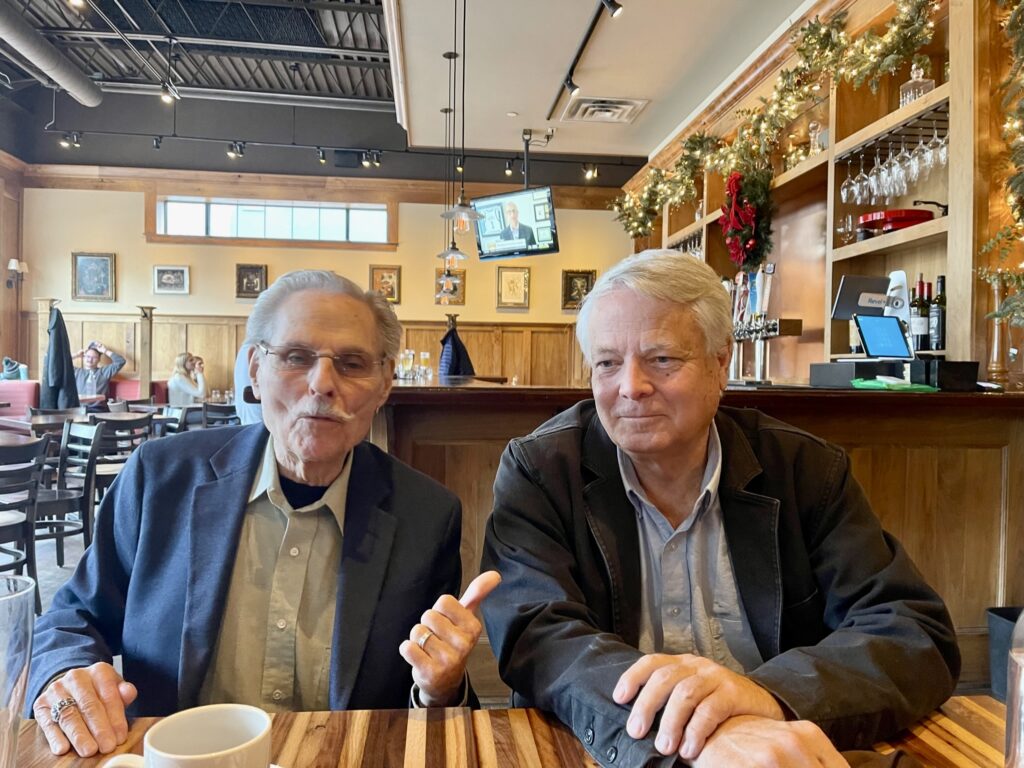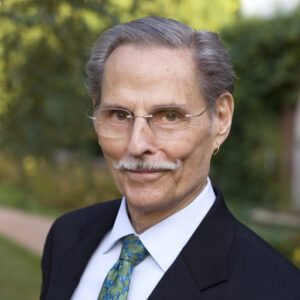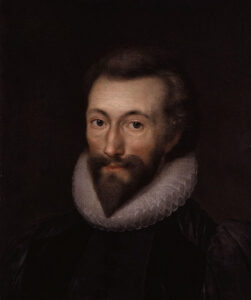Remembering Thomas Clayton, an exceptional man and educator who made all the difference.

I was leaving Three Forks, Montana, when I got the call. My beloved English professor Thomas Clayton died this morning, August 9, 2023. He was 90 years old.
Thomas Jefferson said his William and Mary College mentor William Small, “set the destinies of my life.” The same is true of Thomas Swoverton Clayton, classicist, Rhodes scholar, one of the leading experts on 17th-century poetry. One of the handful of regents professors of English at the University of Minnesota.
He was the single most impressive person I ever met. He had a Vandyke beard and a rapier wit. The first time I encountered him he was introducing Stephen Booth (1933-2020), who was at the University of Minnesota to lecture on Shakespeare’s sonnets. I was a callow sophomore English major taking my first courses in English literature. Mr. Clayton entered the small auditorium like a whirlwind, found the podium, made several self-effacing asides, each with a grimace that might have been self-satisfied, but in fact was just his public and private style. He spoke at about double normal human speed, with a series of brief, learned digressions that evoked appreciative laughter from the cognoscenti in the room but soared right over my head.
I was mesmerized. He was the embodiment of the life of the mind. Although he was wearing a dark suit and tie, he looked as if he had walked straight out of a Restoration drama. He was a compact man. He wore several rings, one with a death’s head.
Stephen Booth gave a good lecture. Afterward I did something I had never done before. I was extremely shy in those days, and pretty sure I was an onion that, once peeled, revealed nothing of value inside. I walked up to the dais and without introducing myself said, “I want to take whatever you are teaching next semester.” He looked at me with sardonic amusement. “Well, it’s Advanced Shakespeare, and it is only open to graduate students. I’m afraid it’s not possible.” I refused to give up. With even greater unprecedented boldness I said, “Wait, how can I convince you to let me into the course?” He studied me for a moment and said, “Write an explication of any passage in Macbeth this weekend and slip it under my door on Monday morning. I make no guarantees. In fact, I think you should consider yourself cashiered.”
First, I had to read Macbeth! I labored over that 2,500-word explication from Friday night to about 3 a.m. Monday, then typed it up and got it under his office door.
A day or two later I turned up at his office hours. I had prepared a hangdog look. “Well, it wasn’t very good, to be blunt, but I’ll take you in the course for your pluck. See you in January.”

I took five or six courses from Professor Clayton: Advanced Shakespeare; Seventeenth Century Poetry, Practical Criticism, another Shakespeare. I worked harder for him than I ever did before or after for anyone. In class I was usually stupefied by his erudition. I often did voluntary all-nighters to prepare for his class. Occasionally I would have something to say in class (invariably imprecise) and afterwards, I would walk from Temporary South Court Engineering (home of the English Department) to the plaza before Northrup Auditorium, but it was more like kicking myself across campus than walking. “Next time, I am going to say something he values.” And then I would go home and begin to prepare for the class two days hence. I was determined to earn his respect. He was — and is — the gold standard in my mind of the humanities professor.
If he so much as mentioned a book that might be worth reading, I rushed to the bookstore or the university library.

Above all he taught me how to read hard poetry. He taught me later Shakespeare, Herbert, Lovelace, Marvel, Jonson, and Webster. Above all he taught me John Donne. I went on to do all my graduate work on the 17th century and wrote about Donne’s sermons and their relation to St. Augustine. During his time at Wadham College, Oxford, young Clayton had studied under the great Dame Helen Gardner (1908-1986), even now one of the greatest scholars of 17th century literature. She, too, was a legendary figure and Mr. Clayton spoke of her with his mix of bemusement and deep respect. He found humor (or at least irony) in everything. When I studied at Oxford, my supervisor was the great John Carey, who was himself a protégé of Dame Helen. Mr. Clayton was a little critical of John Carey, one of the few times I believe he was mistaken. He’s one of Britain’s greatest academic and at the same time greatest public intellectuals.
One day, in my junior year, when I was in Mr. Clayton’s office he said to me, “Have you ever thought about studying at Oxford?” I had not. I knew where Oxford was, and that it had a global reputation, plus ancient spires, but that was it. “I think you would compete well for a Rhodes Scholarship,” said he. I was barely aware of what that was.
And he made it happen. No Thomas Clayton, no four years at Oxford. They were in some ways the best years of my life. I was in love for the first time there. Two of my greatest friendships began in Radcliffe Square. Now my daughter is there, finishing up a doctorate on the Tower of London in the Age of Elizabeth I and James I.
Later, a number of roads diverged and I took paths that led away from university life. I feel I let Mr. Clayton down. I feel I let myself down. As Richard II says, “I wasted time and now doth time waste me.”
John Donne is one of the greatest poets in English. At one time, for about 10 years, his writings were the very center of my existence. Thomas Clayton gave me John Donne. And Donne is precisely his kind of poet — witty, learned, reverent and irreverent (usually in the same poem). Passionate. Paradoxical. Brilliant.
Hamlet at the Old Guthrie Theater
In 2006 the splendid old Guthrie Theater in Minneapolis closed, much lamented, and never adequately replaced by the new Guthrie. Because its first production had been Hamlet, so too was its last. I love last things. I have been to many last performances, including the Spearfish (S.D.) Passion Play, and the last performance (at least back then) of the Grand Ole Opry at the Ryman Auditorium in Nashville.
I was pretty sure Mr. Clayton would decline my invitation to take him to the finale. But he said yes. Said yes in his usual way: “I don’t expect I will find much to admire in the production but come early enough to the house so we can have a glass of grog of some sort and we’ll take it from there.” In fact, he did not like the production much, but — hey — it was Hamlet, which I have by now seen two dozen times in production and in countless film reruns. When I arrived (with three plus ones for protection) he was watching the Minnesota Gophers play basketball on television. What is worse, he knew all the players, had a big NCAA basketball vocabulary. I was a little shocked. Until this moment I had always regarded him as someone who was beyond the diurnal things of life. Of course, he provided wry and disillusioned commentary about the hapless Minnesota Gophers, but seeing him griping at the television screen made me realize that he was human after all.
Here is a tiny sample of Mr. Clayton’s voice as a literary critic:
“A textual critic engaged upon his business is not at all like Newton investigating the motions of the planets; he is much more like a dog hunting for fleas. If a dog hunted for fleas on mathematical principles, basing his researches on statistics of area and population, he would never catch a flea except by accident. They require to be treated as individuals; and every problem which presents itself to the textual critic must be regarded as possibly unique.”
This is characteristically brilliant and bemused.
About 18 months ago, my daughter and I drove from Bismarck, N.D., to Minneapolis to have lunch with Mr. Clayton. I have been telling her since she was 10 years old that one of my principal goals was to make sure she met Thomas Clayton. He named the pub. Although his health was not good, he came in late like a dervish and began to say clever things out of the side of his mouth even before he sat down. The wait staff knew him and brought him his favorite ale unbidden. I was on the edge of tears through the entire lunch, which lasted a couple of hours. Catherine (my daughter) immediately experienced his intellectual charisma and charm. When I stepped out to use the restroom Mr. Clayton spoke in high praise of me in an over-generous way, and that brought her nearly to tears. As he walked off that winter afternoon, I wondered if I would ever see him again. I had regarded him as immortal, but now that my own mortality was a factor, I knew the day would come when I would get the call.
All my life I have tried to live up to the standard of Thomas Clayton, Regents Professor of English (and Classical Studies) at the University of Minnesota.
I end this elegy with two quotations from the 17th century, both frequently invoked by Professor Clayton. This is why we have the humanities — to provide artistic context with and through which we make sense of the mysteries of life.
From my beloved John Donne:
No man is an Iland, intire of itselfe; every man
is a peece of the Continent, a part of the maine;
if a Clod bee washed away by the Sea, Europe
is the lesse, as well as if a Promontorie were, as
well as if a Manor of thy friends or of thine
owne were; any mans death diminishes me,
because I am involved in Mankinde;
And therefore never send to know for whom
the bell tolls; It tolls for thee.
John Donne
That’s from Meditation XVII from Donne’s Devotions Upon Emergent Occasions, which the poet wrote when he thought he was dying in December 1623. I regard it as one of the greatest passages ever written. Mr. Clayton might raise an eyebrow just a smidgen at that claim.
The second is from his beloved Hamlet. Says Horatio to the dying Hamlet:
Good night, sweet prince, and flights of angels sing thee to thy rest.
He’d like that one.
Farewell, Professor Clayton. You made all the difference.
